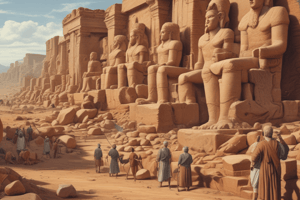Podcast
Questions and Answers
During which century did the growth of studying humanity in its past and current states become more popular among academics and scholars?
During which century did the growth of studying humanity in its past and current states become more popular among academics and scholars?
- 16th century
- 14th century
- 15th century
- 18th century (correct)
Who were some of the early thinkers who dabbled in the social sciences?
Who were some of the early thinkers who dabbled in the social sciences?
- Isaac Newton and Galileo Galilei
- Leonardo da Vinci and Michelangelo
- Plato and Aristotle (correct)
- William Shakespeare and Geoffrey Chaucer
What historical period fostered the growth of philosophical objectivity among scholars and the study of the natural world?
What historical period fostered the growth of philosophical objectivity among scholars and the study of the natural world?
- The Industrial Revolution
- The Enlightenment (correct)
- The Renaissance
- The Middle Ages
What did Darwin's theories concerning the evolution of man lead to?
What did Darwin's theories concerning the evolution of man lead to?
When did the public start showing more interest in the advanced study of humanity's past and present?
When did the public start showing more interest in the advanced study of humanity's past and present?
Who pioneered the emphasis on primary sources in history during the 19th century?
Who pioneered the emphasis on primary sources in history during the 19th century?
Which event inspired the emergence of archaeology as a discipline in the 19th century?
Which event inspired the emergence of archaeology as a discipline in the 19th century?
Who pioneered the study of society as a discipline in the 19th century?
Who pioneered the study of society as a discipline in the 19th century?
Which discipline emerged to study mankind's origins and development, often through evolutionary theories?
Which discipline emerged to study mankind's origins and development, often through evolutionary theories?
Who envisioned applying scientific principles to society with an army of sociologists improving living standards?
Who envisioned applying scientific principles to society with an army of sociologists improving living standards?
Flashcards are hidden until you start studying
Study Notes
- The 19th century saw an increased interest in studying humanity's growth, characteristics, and past due to colonialism, philosophical questions, and scientific discoveries.
- History underwent significant changes with the emphasis on primary sources by German historian Leopold von Ranke.
- Archaeology emerged as a discipline in the 19th century, inspired by Napoleon Bonaparte's excavations in Egypt and the acceptance of evolutionary theories.
- Early archaeologists in England developed delicate excavation techniques and kept scrupulous records.
- Anthropology arose as a discipline to study mankind's origins, development, and beliefs, often through the lens of evolutionary theories.
- Sociology, the study of society, was pioneered by Auguste Comte, who believed scientific principles could be applied to society.
- The 19th century saw theorizing about humanity's past and future, with sociological works often incorporating strains of history and philosophy.
- Karl Marx's work is often classified as philosophy, economics, and sociology.
- The scientific principles and objective investigation used to discover natural laws were applied to society by Comte, who envisioned an army of sociologists improving living standards.
Studying That Suits You
Use AI to generate personalized quizzes and flashcards to suit your learning preferences.




